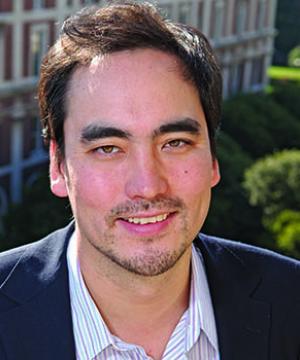Tim Wu in the Center of the Net Neutrality Debate
A rollback of net neutrality rules won’t withstand judicial review, predicts Tim Wu, the professor who coined the term that defines the open internet.
A proposal by the Federal Communications Commission to repeal net neutrality rules may be challenged in court, but first it is being judged in the court of public opinion. And few voices resound more than Tim Wu, a professor at Columbia Law School who has long championed the regulations that ensure equal access to the Internet.
Since Nov. 21, when Ajit Pai, the FCC chairman who is leading the effort to scrap the rules, announced suddenly that the agency would vote in December to do away with them, Wu has been a prominent critic in the media.
In an op-ed published in The New York Times the day following Pai’s announcement, Wu predicted that the dismantling would be overturned in court. He explained that the law disfavors about-faces by federal agencies:
“The problem for Mr. Pai is that government agencies are not free to abruptly reverse longstanding rules on which many have relied without a good reason, such as a change in factual circumstances. A mere change in FCC ideology isn’t enough. As the Supreme Court has said, a federal agency must ‘examine the relevant data and articulate a satisfactory explanation for its action.’ Given that net neutrality rules have been a success by most measures, the justification for killing them would have to be very strong.”
The op-ed was cited by a series of publications, including Recode, Techmeme, the Washington Examiner, TechSpot, the Santa Fe New Mexican, the Terre Haute Tribune Star, and Common Dreams.
It also prompted discussion online.
This country is founded on the free and unimpeded flow of information from all sources to all of us. This is overreach: https://t.co/omWXiyKfZS #protectnetneutrality EG
— Eric Garcetti (@ericgarcetti) November 22, 2017
The FCC’s logic for gutting net neutrality is so weak, and so ideological, that it may well get struck down in court. @superwuster https://t.co/LKOOCxsRZ9.
— Nicholas Thompson (@nxthompson) November 23, 2017
Here are some of the media outlets that have quoted Wu on the proposed rollback:
The New York Times: “It’s an ‘open the champagne bottles’ moment for AT&T. They can just tell people to pony up.”
NPR: “What I’m concerned about is that Pai’s new rules allow blocking... so long as they disclose [everything]. So... Netflix could have been blocked in the cradle... Skype could have been blocked. Even Google could have been slow-laned.”
Marketplace: The move by the FCC “is just upending something which has been working really well.”
CNN Money: “It’s like the Trump administration at large – there is no rhyme or reason or consistency behind the decisions it makes.”
And here are some outlets that have cited Wu’s ideas in their coverage:
The New York Times: In 2003, Tim Wu, a law professor now at Columbia Law School (he’s also a contributor to The New York Times), saw signs of impending corporate control over the growing internet. Broadband companies that were investing great sums to roll out faster and faster internet service to Americans were becoming wary of running an anything-goes network… To Mr. Wu, the broadband monopolies looked like a threat to the end-to-end idea that had powered the internet. In a legal journal, he outlined an idea for regulation to preserve the internet’s equal-opportunity design — and hence was born “net neutrality.”
Bloomberg: “The term ‘network neutrality was coined in 2002 by Tim Wu, a law professor and author. He argued that no authority should be able to decide what kind of information was and wasn’t allowed on the internet. But Wu also recognized the expense of maintaining network hardware, so he proposed that providers should be allowed to charge based on usage. People would pay for more bandwidth, not for access to certain sites. In 2005, the FCC released a statement turning Wu’s principles into policies. When Comcast interfered with access to web networks that used a lot of bandwidth and enabled trading of pirated content, the FCC balked in 2008. Comcast sued, and won. The FCC set new rules and Verizon then challenged them, winning in a U.S. court in early 2014. This then started the process for the 2015 rules.”
Seattle Times: “Wu has pointed out that some form of net neutrality can be traced to FCC oversight of the Bell System monopoly in the 1970s (the old AT&T was broken up in 1982). Later, it kept companies such as CompuServe and AOL from being throttled in the cradle. In 2015, he wrote in Slate, ‘This longstanding neutrality policy has been an incredible success by any measure. Under one or another version of the regime, the internet economy has created at least a million jobs and contributed greatly to the economic growth of the entire country, even when the rest of the economy was flat.’”
Reason: The concept of net neutrality is often poorly understood. The ‘open internet order’ promulgated by then-President Barack Obama was not based on the same principles laid out by law professor Tim Wu, who coined the term network neutrality. For Wu, it was obvious that ‘a total ban on network discrimination...would be counterproductive,’ but that's what the Federal Communications Commission did in 2015... It's impossible to say exactly what kind of innovations such rules are thwarting, because they're being thwarted.”
###
Related reading
A Proposal for Network Neutrality
Network Neutrality, Broadband Discrimination
Columbia Law School Professor Tim Wu Comments on Federal Appeals Court Decision on Net Neutrality
Posted on Nov. 28, 2017
